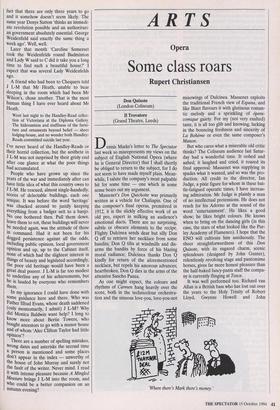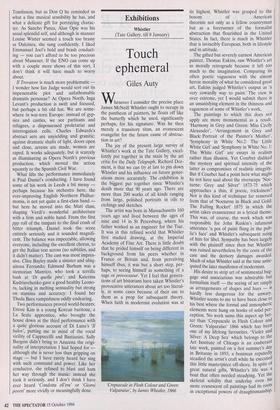ARTS
Opera
Some class roars
Rupert Christiansen
Don Quixote (London Coliseum) II Trovatore (Grand Theatre, Leeds) Dennis Marks's 's letter to The Spectator last week so misrepresents my views on the subject of English National Opera (where he is General Director) that I shall shortly be obliged to return to the subject, for I do not seem to have made myself plain. Mean- while, I salute the company's most palpable hit for some time — one which in some sense bears out my argument.
Massenet's Don Quichotte was primarily written as a vehicle for Chaliapin. One of the composer's final operas, premiered in 1912, it is the slickly effective work of an old pro, expert in milking an audience's emotional ducts. There are no surprising, subtle or obscure elements to the recipe. Flighty Dulcinea sends dear but silly Don Q off to retrieve her necklace from some bandits; Don Q tilts at windmills and dis- arms the bandits by force of his blazing moral radiance; Dulcinea thanks Don 0 kindly for return of the aforementioned necklace, but repels his amorous advances; heartbroken, Don Q dies in the arms of the attentive Sancho Panza.
As one might expect, the colours and rhythms of Carmen hang heavily over the score, both in the technicolour orchestra- tion and the sinuous love-you, love-you-not miaowings of Dulcinea. Massenet exploits the traditional French view of Espana, and like Bizet flavours it with glutinous roman- tic melody and a sprinkling of 6pera- comique gaiety. For my (not very exalted) taste, it is all too glib and knowing, lacking in the bouncing freshness and sincerity of La Boheme or even the same composer's Manon.
But who cares what a miserable old critic thinks? The Coliseum audience last Satur- day had a wonderful time. It oohed and aahed, it laughed and cried, it roared its final approval: Massenet was supplying in spades what it wanted, and so was the pro- duction. All credit to the director, Ian Judge, a pixie figure for whom in these bat- tle-fatigued operatic times, I have increas- ing admiration. Mr Judge is plainly a man of no intellectual pretensions. He does not reach for his Adorno at the sound of the word 'entertainment'. He likes a good show; he likes bright colours. He knows when to bring on the dancing girls (in this case, the stars of what looked like the Pur- ley Academy of Flamenco). I hope that the ENO will cultivate him assiduously. The sheer straightforwardness of this Don Quixote, with its sugared charm, scenic splendours (designed by John Gunter), relentlessly revolving stage and pantomime horses, gives far more honest pleasure than the half-baked fancy-pants stuff the compa- ny is currently flinging at Tosco. It was well performed too. Richard van Allan is a British bass who has lost out over the years to the Holy Trinity of Robert Lloyd, Gwynne Howell and John `Where there's Mark there's money.' Tomlinson, but as Don Q he reminded us what a fine musical sensibility he has, and what a delicate gift for portraying charac- ter. As Sancho Panza, Alan Opie was his usual splendid self, and although in manner Louise Winter seemed a touch too brassy as Dulcinea, she sang confidently. I liked Emmanuel Joel's bold and brash conduct- ing — you can't afford to be too precious about Massenet. If the ENO can come up with a couple more shows of this sort, I don't think it will have much to worry about.
Il Trovatore is much more problematic I wonder how Ian Judge would sort out its impenetrable plot and unfathomable dramatis personae? At Opera North, Inga Levant's production is swift and focused, but perhaps a bit old hat. We are some- where in war-torn Europe: instead of gyp- sies and castles, we see partisans and refugees, a dispossessed proletariat and interrogation cells. Charles Edwards's abstract sets are unyielding and granitic: against dramatic shafts of light, doors open and close, arrests are made, women are raped. It works adequately, but is scarcely as illuminating as Opera North's previous production, which moved the action squarely to the Spanish Civil War.
What lifts the performance immediately is Paul Daniel's conducting. I have found some of his work in Leeds a bit messy perhaps because his orchestra here, the ever-improving English Northern Philhar- monia, is not yet quite a first-class band but here he moved into the Muti class, shaping Verdi's wonderful architecture with a firm and noble hand. From the first ppp roll of the timpani to the final crash of bitter triumph, Daniel took the score entirely seriously and it sounded magnifi- cent. The balance was impeccable, allowing everyone, including the excellent chorus, to get the Italian text across (no subtitles, and it didn't matter). The cast was most impres- sive. Clive Bayley made a sinister and ubiq- uitous Ferrando; Edmund Barham was a stentorian Manrico, who took a terrific bash at 'Di quella pira'; and Katerina Kudriavchenko gave a good healthy Leono- ra, lacking in melting sensuality but strong on stamina and accuracy: I found her Theda Bara vampishness oddly endearing.
Two performances proved world-beaters; Ettore Kim is a young Korean baritone, a La Scala apprentice, who brought the house down at the third performance with a quite glorious account of Di Luna's 11 balen', putting me in mind of the vocal virility of Cappuccilli and Bastianini. Sally Burgess didn't bring to Azucena the origi- nality of interpretation I had hoped for although she is never less than gripping on stage — but I have rarely heard her sing with such command and power. Like her conductor, she refused to blast and ham her way through the music: instead she took it seriously, and I don't think I have ever heard `Condotta ell'era' or `Giorni paved' more vividly or meaningfully done.



























































 Previous page
Previous page